Swimmer’s Ear Home Remedies: 7 Effective Ways To Find Relief
Get rid of waterlogging in the ears after swimming to avoid discomfort and infections.

Image: Shutterstock

Getting water stuck in your ear after a nice swim or after a long soak in the tub can be quite annoying. To remove the water and get over that irritating feeling you perform all sorts of tricks and stick q-tips into your ears. Even though you manage to get most of it out or you think you’ve gotten all of it out, a tiny bit tends to remain inside. This remaining water can cause swimmer’s ear. What is swimmer’s ear? And how do you treat it? Keep reading this article to know more about swimmer’s ear home remedies.
In This Article
What Is Swimmer’s Ear?
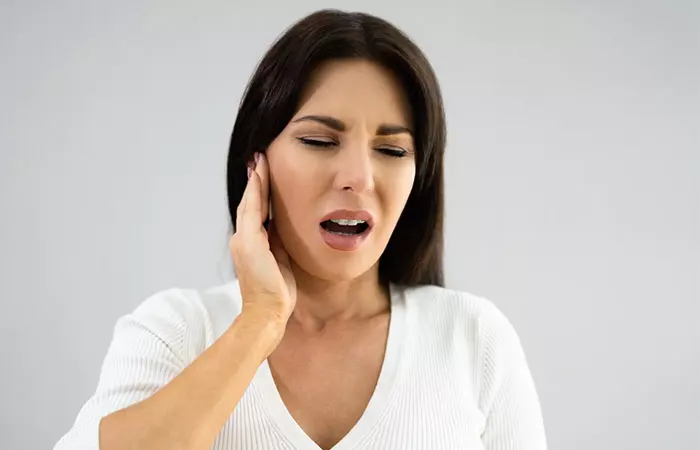
Swimmer’s ear, medically known as Otitis Externa (OE) is a bacterial infection that is caused by waterlogging in the ear after a swim or a bath. This occurs commonly during the summers and in regions that have a warm tropical climate. Based on its severity, OE can be classified as acute or chronic. Acute OE can last anywhere from 1-6 weeks, whereas chronic OE can last for more than 3 months (1).
Your inner ear canal is protected with tiny hair follicles and ear wax that keep bacteria away by creating an acidic environment. In the case of swimmer’s ears, bacteria such as Pseudomonas aeruginosa and Staphylococcus aureus enter your ear canal and infect it. This causes inflammation, disruption in the pH levels, and loss of ear wax in your ear canal.
People often get confused between a regular ear infection and swimmer’s ear. A regular ear infection is caused due to an infection in the middle ear (otitis media) (2). Whereas, swimmer’s ear is caused due to an infection in the external auditory canal (1).
 Trivia
TriviaSwimmer’s ear is mostly caused by waterlogging, however, there are few other factors that can cause this infection. Let us understand some of the other causes and symptoms in the next section.
Key Takeaways
- Swimmer’s ear is a bacterial infection in the ear’s external auditory canal caused mostly due to waterlogging.
- Bacteria like Pseudomonas aeruginosa and Staphylococcus aureus are primarily responsible for this condition.
- While it affects one in every 10 individuals, it is more common in 7-14 years.
- Some of its symptoms include itching, headache, temporary loss of hearing, etc.
Causes And Symptoms Of Swimmer’s Ear
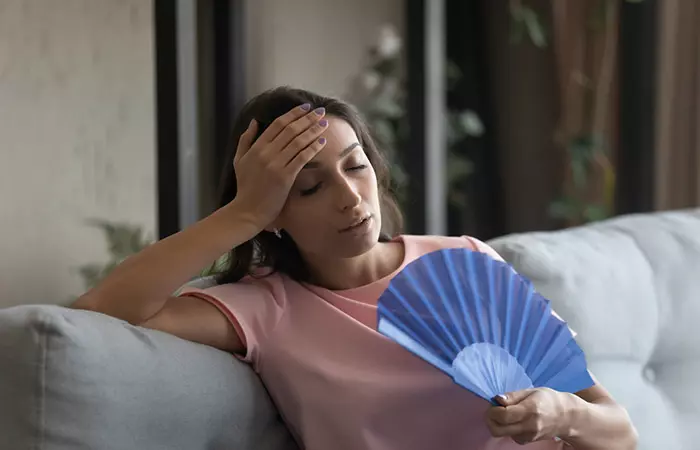
Swimmer’s ear can affect anyone, research suggests that children between the age of 7-14 years are more likely to be affected. Also, nearly 10% of the population will be affected by this infection. If you are one among the 10%, here are a few reasons why you may get this infection (1):
- Humidity
- Trauma to the auditory canal by external devices like cotton swabs, earplugs, and hearing aids
- Skin diseases like eczemai A chronic skin condition characterized by irritation, dryness, inflammation, and red rashes on the skin that does not have a cure. and psoriasisi A chronic skin condition that causes itchiness, rashes, and scaly patches, especially on the knees, scalp, elbows, and trunk.
- Narrow external ear canals
- Foreign objects obstructing your ear canal
- Stress
- Cancer treatments such as radiotherapy and chemotherapy
- If you are immunocompromisedi A condition in which the immune system loses its natural ability to fight diseases, making a person more prone to infections and viruses.
Symptoms Of Swimmer’s Ear
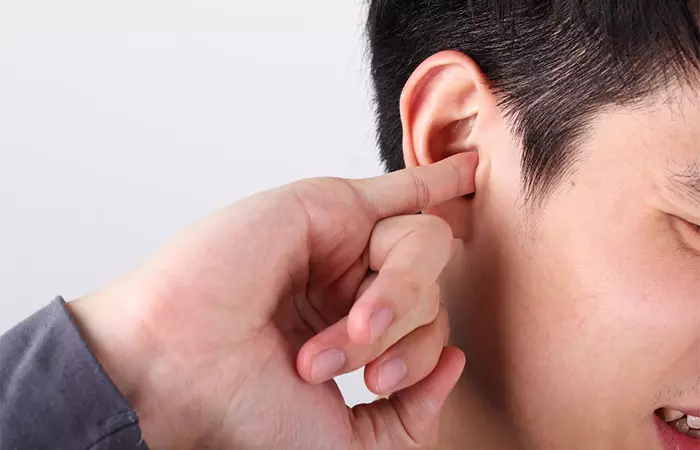
Some of the common symptoms of swimmer’s ear are (3):
- Itching in the ear
- Severe earache
- Temporary loss of hearing
- Redness
- Discharge of foul-smelling fluid from the ear
Alex Rowe, a blogger, recounted his struggle with swimmer’s ear. In his blog, he writes, “My ear canal swelled mostly shut. They prescribed me hardcore painkillers that I didn’t take, and some ear drops. It felt like it would never get better. But it did in a few days that felt like a lifetime (i).”
If you notice any of these swimmer’s ear symptoms, there is no need to be alarmed. You can try a few simple home remedies for swimmer’s ear that may help resolve the problem or alleviate a few of the symptoms.
Home Remedies For Swimmer’s Ear
Swimmer’s ear is generally treatable at home and can be quickly resolved with appropriate treatment.
The longer you leave it untreated, the greater are the chances of increasing the severity of the infection.
Here are a few remedies for swimmer’s ear treatment.
- Drain As Much Water As Possible
The first and the most important thing to do is remove water logged in your ears. To achieve the same, you may also try some below-given methods or some remedies for ear drainage that can work like magic:
- You can try jiggling your earlobes while tilting your head downwards.
- Another technique is to lie down sideways for a few minutes with a towel under your ear to absorb the water when it drains.
- Try creating a vacuum by cupping your ears with your palms and rapidly shaking your head up and down and side to side
- Keep Your Ears Dry
It is an effective swimmer’s ear prevention technique.
You can keep your ear canals dry to an extent by purchasing swimmers earplugs that help prevent water from entering your ears. These come in different shapes and sizes. Make sure you invest in slightly expensive earplugs as they are reliable and offer better protection than the cheaper ones.
 Quick Tip
Quick Tip- Try Rubbing Alcohol And Vinegar
You can combine rubbing alcohol (isopropyl alcohol) and vinegar to make homemade swimmer’s ear drops. Research suggests that this combination is effective in treating bacterial ear infections (4). To prepare these drops you will need to do the following.
- Mix equal amounts of isopropyl alcohol with equal parts of vinegar.
- Use a pipet or dropper to apply 2-3 drops inside your ear.
- Gently rub the outside and the back of your ears.
- Wait for 30-45 seconds and tilt your head sideways to drain the drops.
- Try Using Hydrogen Peroxide
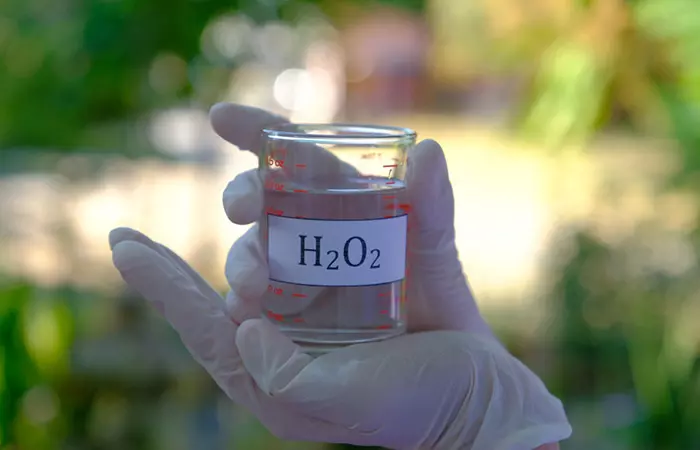
Using hydrogen peroxide drops for swimmer’s ear can help clear any debris and excess earwax that might be trapping the water. Studies suggest that topical application of hydrogen peroxide solution can help soften ear wax and any crust formation inside the ear canal (5). If you are worried whether hydrogen peroxide is safe for ears, fret not. Hydrogen peroxide drops in the form of oxydol are generally prescribed by doctors for ear infections in infants (6).
Avoid using hydrogen peroxide solution for ear cleaning if any of these conditions apply to you:
- You have cuts or other physical injuries in your ears
- Your ear is swollen or bleeding
- Your eardrum is ruptured
- Use A Warm Compress
Heat may help relieve the pain and inflammation associated with a swimmer’s ear. Dip a washcloth in warm water and place it on the infected ear. You can also cover a hot water bottle with a cloth and hold it over the infected ear for a few minutes. Repeat this several times during the day until you experience relief.
- Try Using Garlic And Extra Virgin Olive Oil
Research suggests that garlic-infused extra virgin olive oil can be used as an alternative treatment for ear infections. This oil contains antibacterial and antimicrobial properties that can help reduce infection (7). You can buy this oil from a supermarket or online retailer. This is one of the effective home remedies for ear infections. To use this technique, here is what you need to do.
- Warm-up 1 teaspoon of garlic extra virgin olive oil in a small bowl
- Apply a few drops on the underside of your wrist to check the temperature. It should feel lukewarm on your skin.
- Using a sterile dropper pour a few drops into the affected ear.
- Now lie down on your opposite side for 10-15 minutes and let the oil work.
- After 10-15 minutes, sit upright and tilt your head downwards to drain the oil and water.
- Try OTC Medication

There are plenty of OTC medicines that are available for ear infections and ear pain. Most of these are alcohol-based and can help remove the water or excess wax. However, consult with your doctor before you self-medicate.
If you don’t notice a change in the symptom after trying these home remedies or if the symptoms worsen, you need to seek medical help.
When To See A Doctor
In some cases of swimmer’s ear when the infection is very severe, you will need to seek medical advice. This might include symptoms like extreme pain, redness, swelling, or drainage, that persists even after using home remedies. Your doctor will ask you about your symptoms, such as ear pain or itching to diagnose swimmer’s ear. This is followed by a physical examination, wherein the doctor checks the skin around the ear and nearby lymph nodes for signs of infection. They also examine the ear canal using a special tool called an otoscopei A medical tool that shines a light allowing one to look into the ears to examine the cause of symptoms like loss of hearing and earache. . for signs like redness, swelling, and yellow, white, or gray debris (1). They will then prescribe medication and further treatment based on the severeity of the infection.
In case your eardrum has ruptured due to the infection or by inserting foreign objects to remove the water, you will be referred to an ENT specialist. This specialist will further examine your condition and prescribe the next course of treatment.
If your condition doesn’t respond to treatment, your doctor will collect a sample of the fluid, debris, or ear wax for analysis. This will help identify the bacteria that is causing the infection and appropriate antibiotics can then be prescribed to treat it.
Prevention is always better than cure, and a swimmer’s ear is no different. Read on for some preventive strategies that will help keep the condition at bay.
Prevention Strategies Against Swimmer’s Ear
Here are some tips you can follow to prevent swimmer’s ear:
- Always dry your ears after bathing or swimming. Simply tilt your head to each side to drain water, and dry the outer ear using a soft towel.
- Avoid swimming in polluted or untreated water that may be full of harmful bacteria. Instead, opt for clean, well-maintained pools.
- Wear earplugs during swimming to prevent water from entering your ears.
- Avoid using cotton swabs, pencils, or keys in your ear canal, as these can cause irritation.
- Avoid using hair products or chemicals that can irritate the ear canal. Protect your ears with cotton balls if you have to use them.
Discover the seven most effective ways to bid farewell to swimmer’s ear. Check this video to learn about preventive measures and home remedies that can help you make a splash worry-free.
Infographic: 5 Simple Ways To Treat Swimmer’s Ear
Whether you are a seasoned swimmer or just cooling off in the pool, swimmer’s ear can strike unexpectedly. If you want to ensure that your aquatic adventures remain enjoyable and free from ear discomfort, you need to follow certain tips. Check out the infographic below for 5 easy ways to remove water from the ears and tackle this ear infection effortlessly.
Some thing wrong with infographic shortcode. please verify shortcode syntaxIn conclusion, swimmers’ ear is a bacterial infection generally caused due to waterlogging in your auditory ear canal. There are a few swimmers’ ear remedies like using rubbing alcohol and vinegar or garlic-infused extra virgin olive that may help remove water and prevent infection. You can also try some OTC ear drops, however, you need to check with your doctor before self-medicating. If your symptoms don’t reduce after trying home remedies, you may need to seek medical help.
Frequently Asked Questions
Why is swimmer’s ear so painful?
Swimmer’s ears can get extremely painful as the bacteria proliferate in the ear canal and cause inflammation. Any external pressure on the infected site, such as tugging or pulling can often worsen the pain.
What happens if swimmer’s ear goes untreated?
An untreated swimmer’s ear may go away on its own in some cases. However, in case of severe infections, complications such as hearing loss (often reversible) and even brain damage may occur.
Does ibuprofen help with swimmer’s ear?
Yes, ibuprofen may help relieve the inflammation and pain associated with swimmer’s ear.
Personal Experience: Source
StyleCraze's articles are interwoven with authentic personal narratives that provide depth and resonance to our content. Below are the sources of the personal accounts referenced in this article.
i. Don’t Be Afraid — My Weird Ear Saga;https://xander51.medium.com/dont-be-afraid-my-weird-ear-saga-2253fa241b61
References
Articles on StyleCraze are backed by verified information from peer-reviewed and academic research papers, reputed organizations, research institutions, and medical associations to ensure accuracy and relevance. Read our editorial policy to learn more.
- Otitis Externa
https://www.ncbi.nlm.nih.gov/books/NBK556055/ - Acute Otitis Media
https://www.ncbi.nlm.nih.gov/books/NBK470332/ - Otitis Externa
https://www.ncbi.nlm.nih.gov/labs/pmc/articles/PMC4466798/ - Evaluating The Effect Of A Mixture Of Alcohol And Acetic Acid For Otomycosis Therapy
https://www.researchgate.net/publication/229025251_Evaluating_the_effect_of_a_mixture_of_alcohol_and_acetic_acid_for_otomycosis_therapy - Otitis Externa: A Practical Guide to Treatment and Prevention
https://www.aafp.org/pubs/afp/issues/2001/0301/p927.html - Efficacy Of Ear Lavage With 3% Hydrogen Peroxide Solution (oxydol) For Refractory Aural Discharge Related To Acute Infantile Otitis Media
https://www.researchgate.net/publication/316828523_Efficacy_of_ear_lavage_with_3_hydrogen_peroxide_solution_oxydol_for_refractory_aural_discharge_related_to_acute_infantile_otitis_media - Study Of The Synergism Effect Of Garlic And Extra Virgin Olive Oil Against Some Otitis Externa And Otitis Media Bacteria In Vitro
https://www.researchgate.net/publication/344463947_STUDY_OF_THE_SYNERGISM_EFFECT_OF_GARLIC_AND_EXTRA_VIRGIN_OLIVE_OIL_AGAINST_SOME_OTITIS_EXTERNA_AND_OTITIS_MEDIA_BACTERIA_IN_VITRO
Read full bio of Dr. Monisha Bhanote
Read full bio of Sanchari Bhattacharya
Read full bio of Arshiya Syeda
Read full bio of Payal Karnik






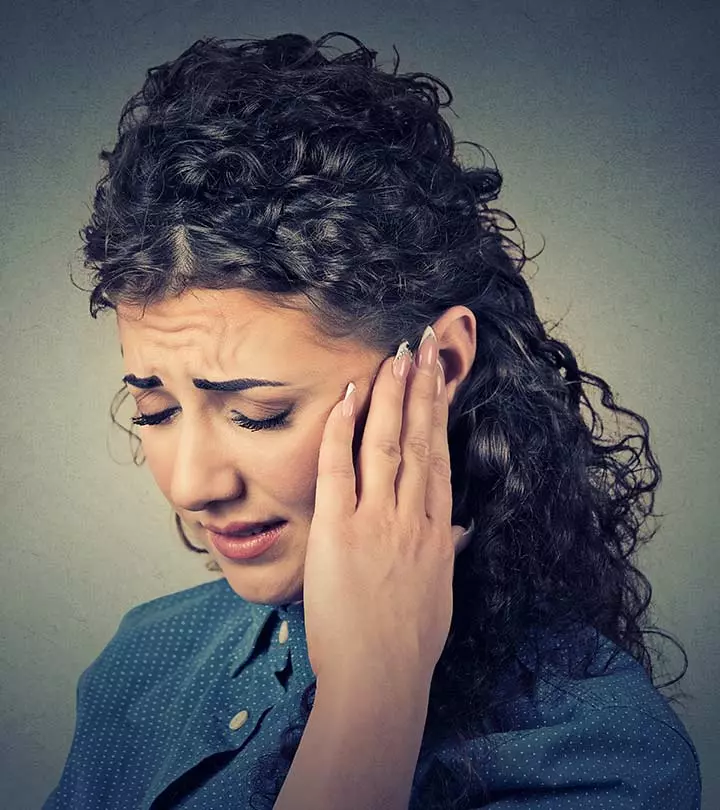
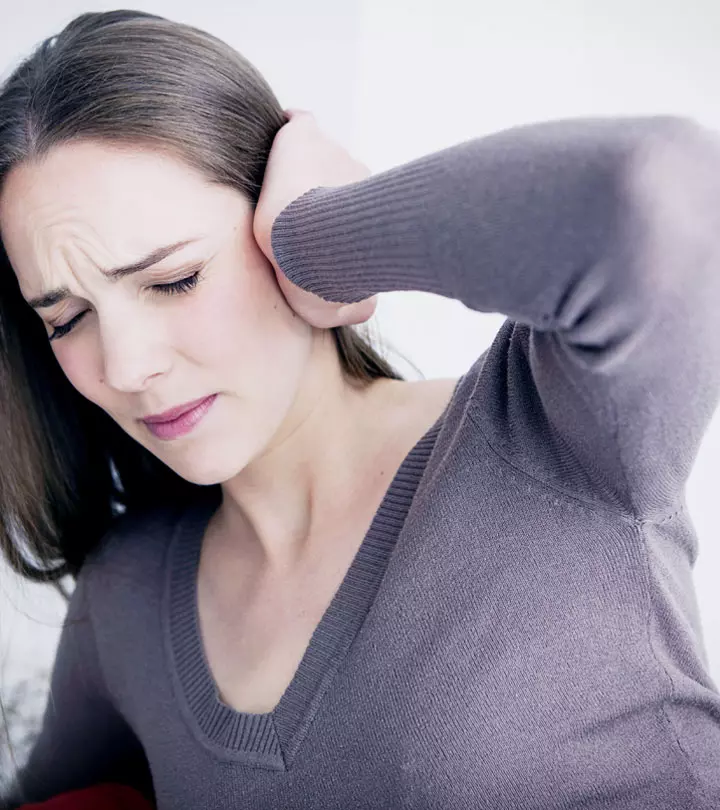

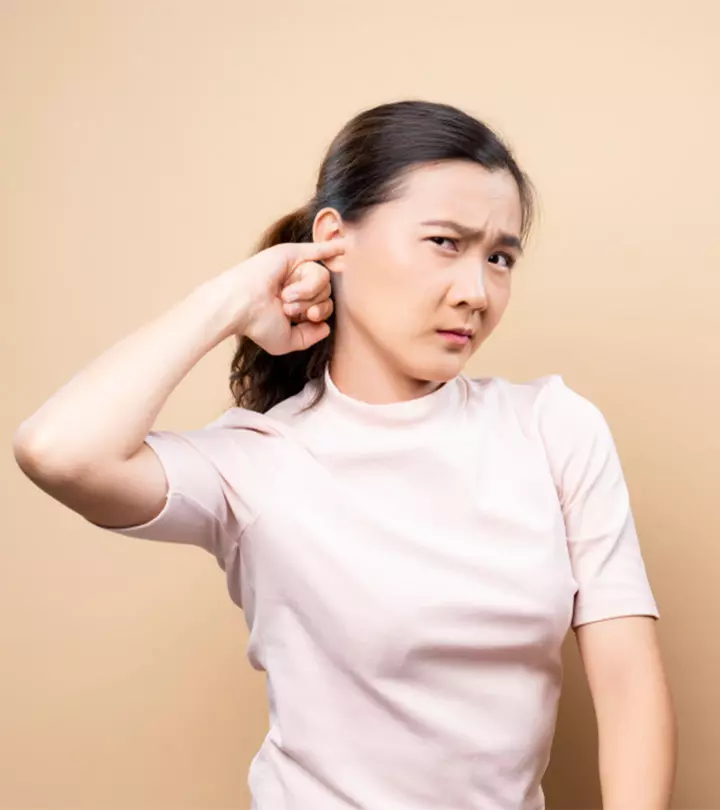
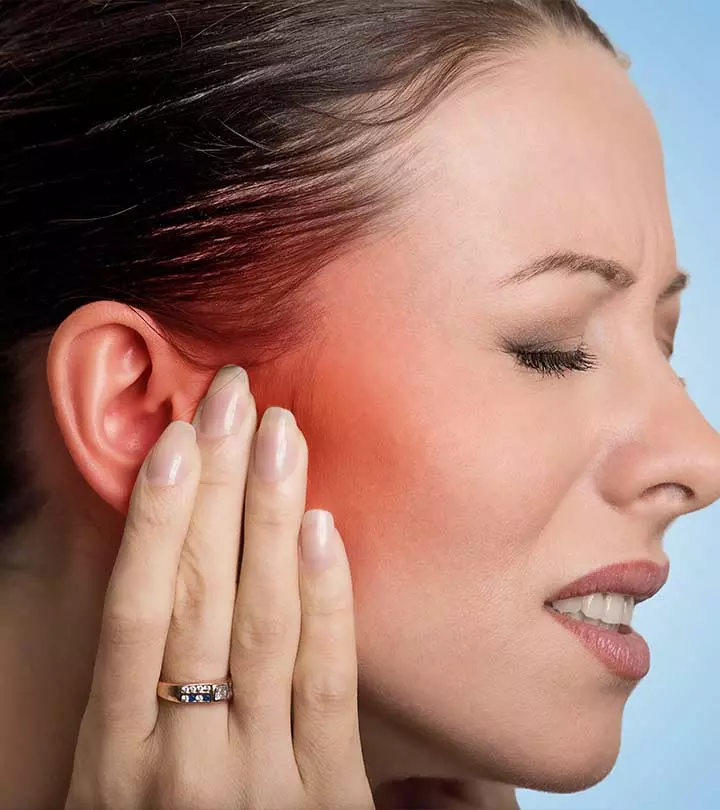
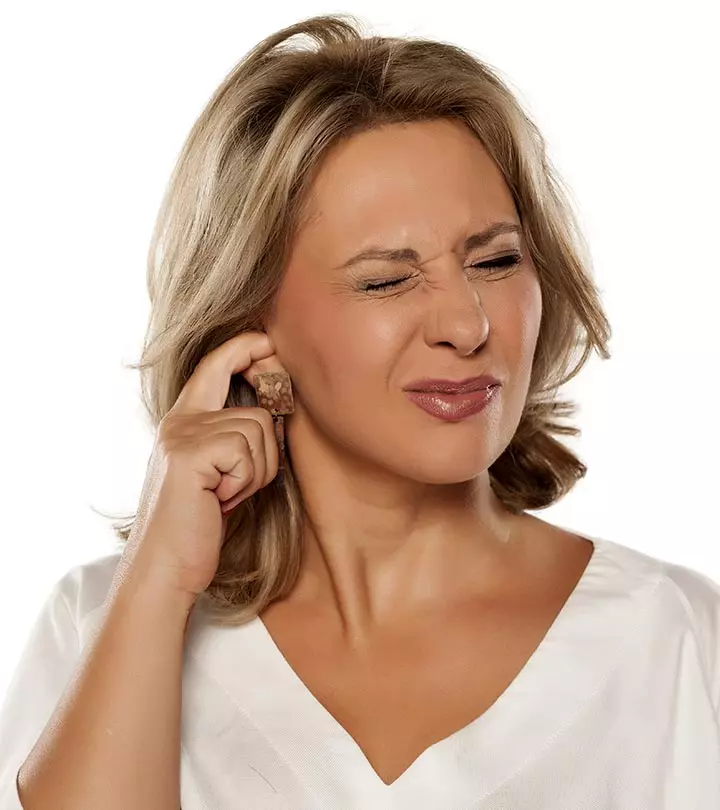
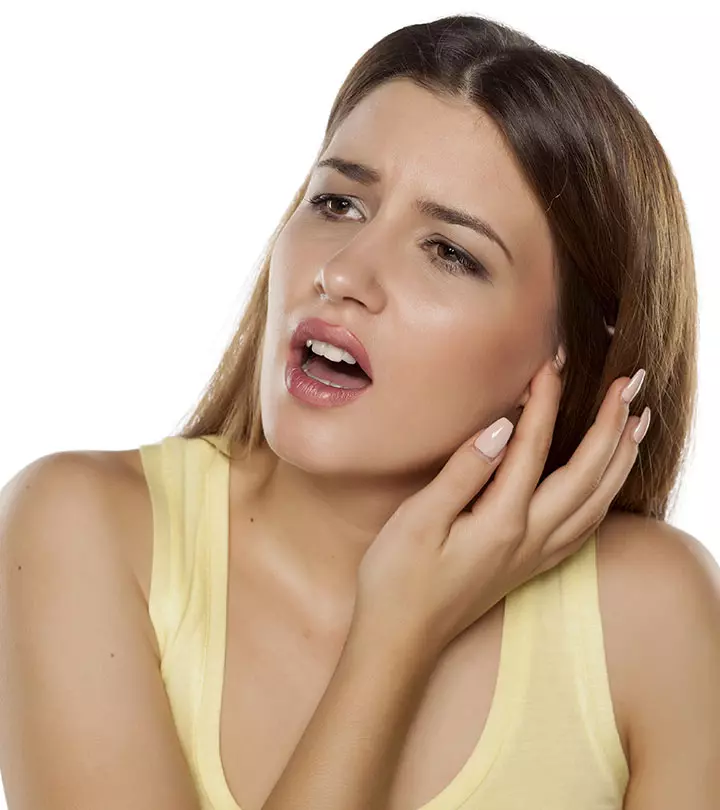
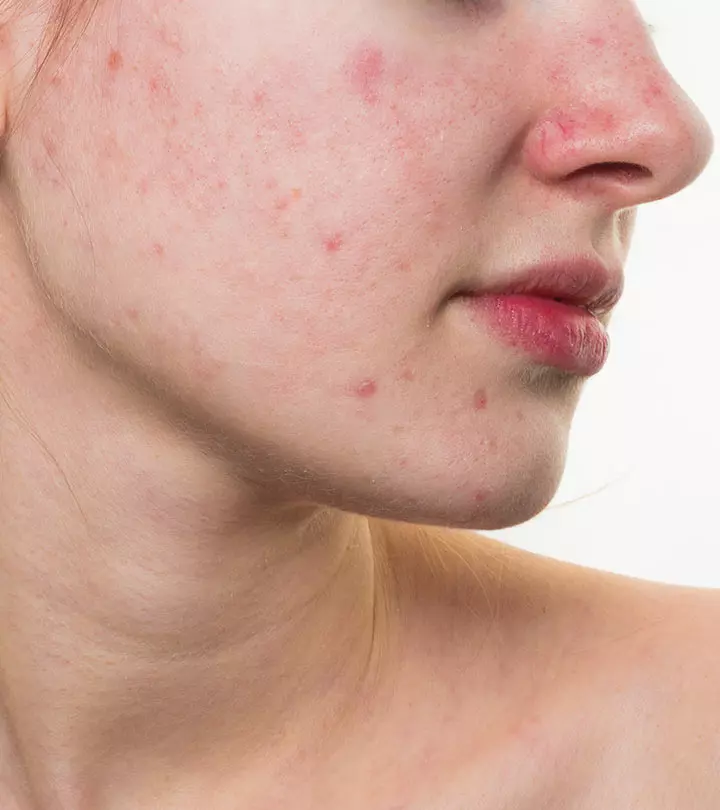

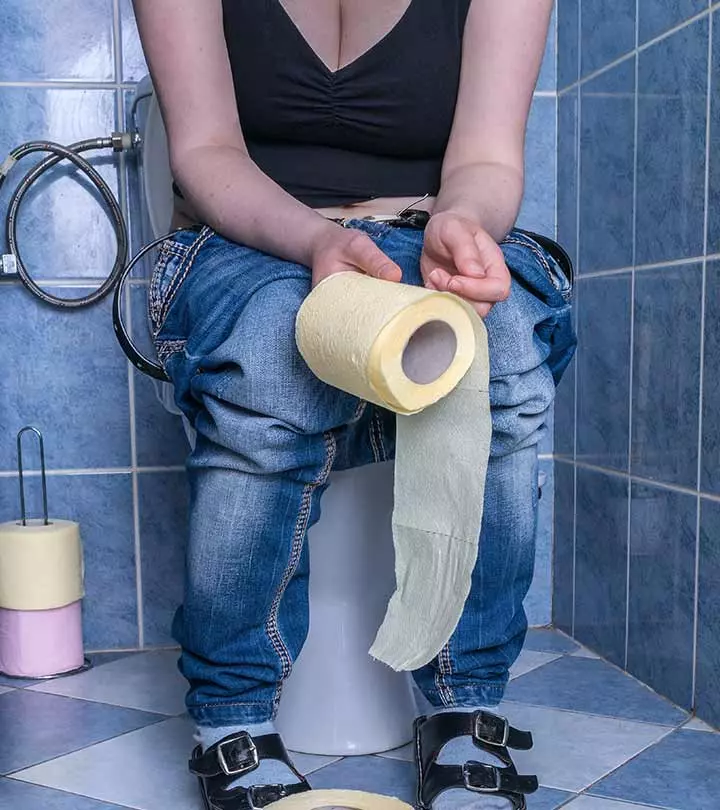


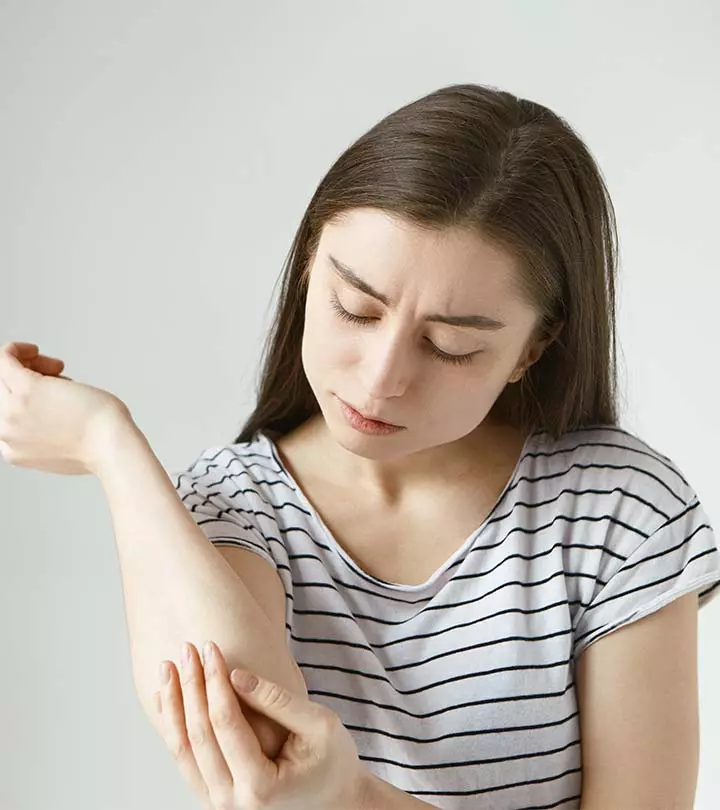

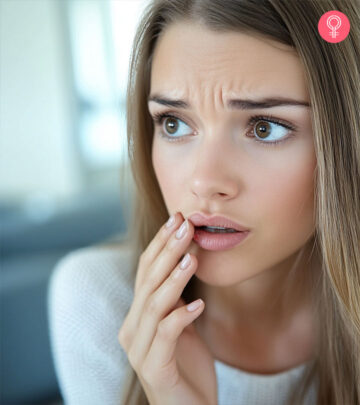
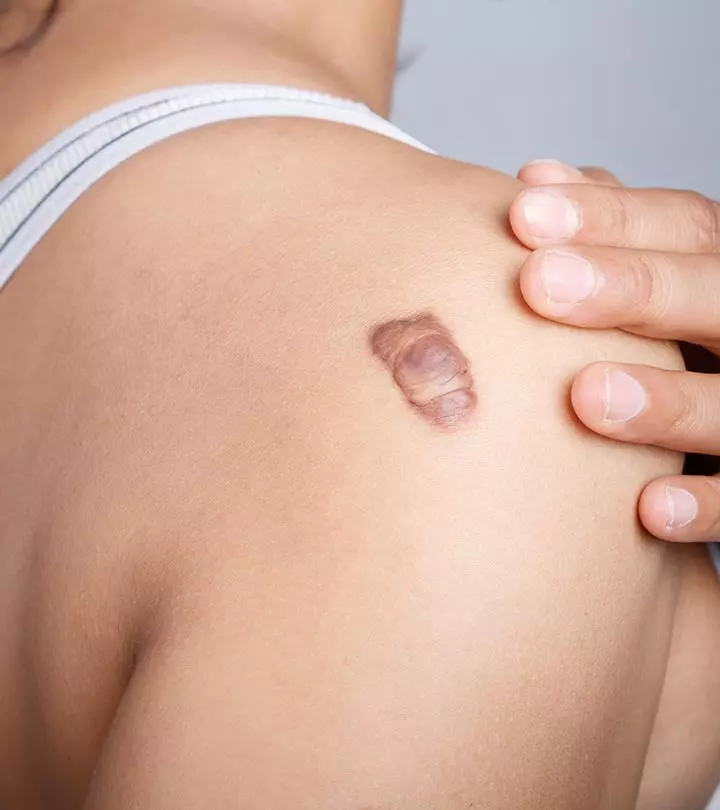




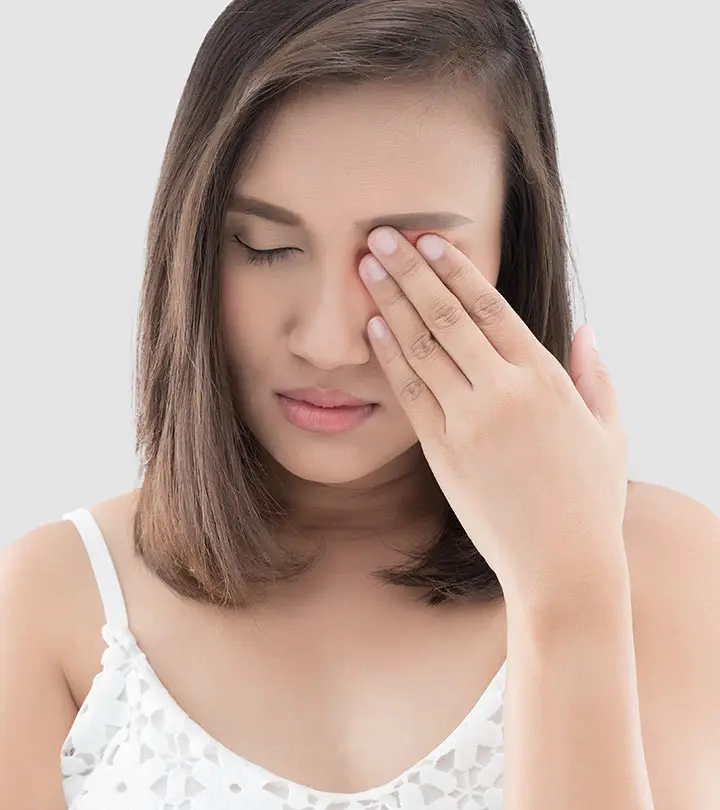
Community Experiences
Join the conversation and become a part of our empowering community! Share your stories, experiences, and insights to connect with other beauty, lifestyle, and health enthusiasts.